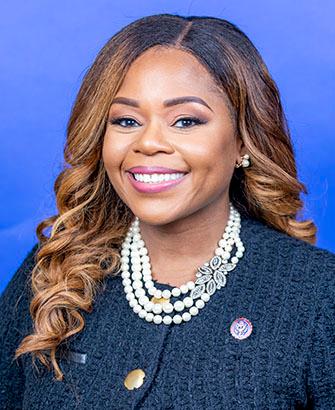A Florida Democratic in the United States House of Representatives is officially under investigation for possible violations of campaign finance laws.
In a Dec. 27 press release, the United States House Committee on Ethics announced that it will launch an investigation into allegations that U.S. Rep. Sheila Cherfilus-McCormick (D-Fla.) violated campaign finance laws and committed other possible violations.
“Pursuant to Committee Rule 7,” the release states, Committee Chairman Michael Guest (R-Mississippi) and Ranking Member Susan Wild (D-Pennsylvania) confirmed that “in accordance with House Rule XI, clause 3, and Committee Rules 10(a)(2) and 17A, the Committee unanimously voted to establish an Investigative Subcommittee” to investigate and determine whether Ms. Sheila Cherfilus-McCormick “violated the Code of Official Conduct or any law, rule, regulation, or other applicable standard of conduct in the performance of her duties or the discharge of her responsibilities, with respect to allegations that she may have violated campaign finance laws and regulations in connection with her 2022 special election.”
The probe will also examine whether she “failed to properly disclose required information on statements to be filed with the House” and whether she “accepted voluntary services for official work from an individual not employed in her congressional office.
Cherfilus-McCormick was elected to represent Florida’s 20th Congressional District in a special election in 2022 to fill the vacancy created by the death of Democratic Rep. Alcee Hastings.
The details of the allegations have yet to be confirmed.
However, a June 30, 2022, report by Inside Elections revealed that some of Ms. Cherfilus-McCormick’s campaign ads had come under scrutiny.
Campaign Ads Appear to Cross Ethics Line
While members of Congress are permitted to use official funds for TV ads that cover official business and avoid campaign content, efforts by Ms. Cherfilus-McCormick appeared to cross the line.
While most campaign ads end with the familiar phrase, “I’m [candidate stating name], and I approve this message,” each of the three separate commercials, which aired in South Florida during Ms. Cherfilus-McCormick’s campaign, began and ended the same way, including a telling disclaimer: “Paid for with official funds from the office of Congresswoman Sheila Cherfilus-McCormick.”
According to House ethics rules, “Official resources of the House must, as a general rule, be used for the performance of official business of the House, and hence those resources may not be used for campaign or political purposes. The laws and rules referenced in this section reflect “the basic principle that government funds should not be spent to help incumbents gain reelection.”
“The misuse of the funds and other resources that the House of Representatives entrusts to Members for the conduct of official House business is a very serious matter,” the website states. “Depending on the circumstances, such conduct may result in not only disciplinary action by the House, but also criminal prosecution.”
“Among the specific activities that clearly may not be undertaken in a congressional office or using House resources (including official staff time) are the solicitation of contributions; the drafting of campaign speeches, statements, press releases or literature; the completion of FEC reports; the creation or issuance of a campaign mailing; and the holding of a meeting on campaign business,” the website clarifies further, adding, “The same prohibition applies to any activity that is funded to any extent with campaign funds, even if the activity is not overtly political in nature.”
In the contracts Cherfilus-McCormick signed with television providers to place the ads, Inside Politics indicated that she identified herself as a political candidate and her campaign office as the addressee in one contract.
Patricia Tolson is an award-winning Epoch Times reporter who covers human interest stories, election policies, education, school boards, and parental rights.
Ms. Tolson has 20 years of experience in media and has worked for outlets including Yahoo!, U.S. News, and The Tampa Free Press. Send her your story ideas: [email protected]
Author’s Selected Articles





